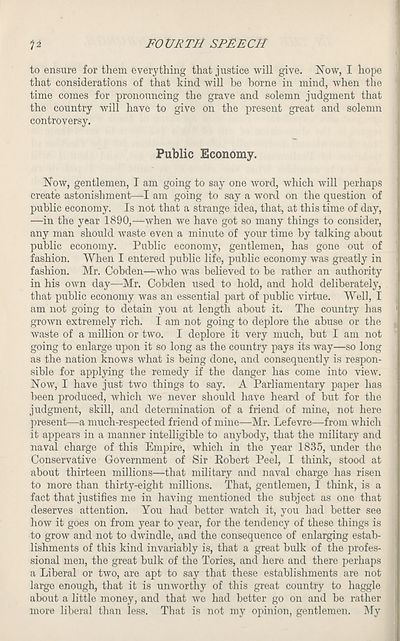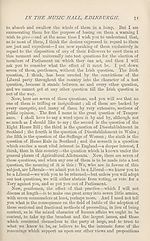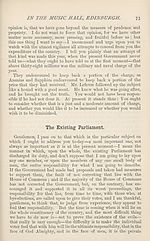Download files
Complete book:
Individual page:
Thumbnail gallery: Grid view | List view

FOURTH SPEECH
?2
to ensure for them everything that justice will give. Now, I hope
that considerations of that kind will be borne in mind, when the
time comes for pronouncing the grave and solemn judgment that
the country will have to give on the present great and solemn
controversy.
Public Economy.
Now, gentlemen, I am going to say one word, which will perhaps
create astonishment—I am going to say a word on the question of
public economy. Is not that a strange idea, that, at this time of day,
—in the year 1890,—when we have got so many things to consider,
any man should waste even a minute of your time by talking about
public economy. Public economy, gentlemen, has gone out of
fashion. When I entered public life, public economy was greatly in
fashion. Mr. Cobden—who was believed to be rather an authority
in his own day—Mr. Cobden used to hold, and hold deliberately,
that public economy was an essential part of public virtue. Well, I
am not going to detain you at length about it. The country has
grown extremely rich. I am not going to deplore the abuse or the
waste of a million or two. I deplore it very much, but I am not
going to enlarge upon it so long as the country pays its way—so long
as the nation knows what is being done, and consequently is respon¬
sible for applying the remedy if the danger has come into view.
Now, I have just two things to say. A Parliamentary paper has
been produced, which we never should have heard of but for the
judgment, skill, and determination of a friend of mine, not here
present—a much-respected friend of mine—Mr. Lefevre—from which
it appears in a manner intelligible to anybody, that the military and
naval charge of this Empire, which in the year 1835, under the
Conservative Government of Sir Robert Peel, I think, stood at
about thirteen millions—that military and naval charge has risen
to more than thirty-eight millions. That, gentlemen, I think, is a
fact that justifies me in having mentioned the subject as one that
deserves attention. You had better watch it, you had better see
how it goes on from year to year, for the tendency of these things is
to grow and not to dwindle, and the consequence of enlarging estab¬
lishments of this kind invariably is, that a great bulk of the profes¬
sional men, the great bulk of the Tories, and here and there perhaps
a Liberal or two, are apt to say that these establishments are not
large enough, that it is unworthy of this great country to haggle
about a little money, and that we had better go on and be rather
more liberal than less. That is not my opinion, gentlemen. My
?2
to ensure for them everything that justice will give. Now, I hope
that considerations of that kind will be borne in mind, when the
time comes for pronouncing the grave and solemn judgment that
the country will have to give on the present great and solemn
controversy.
Public Economy.
Now, gentlemen, I am going to say one word, which will perhaps
create astonishment—I am going to say a word on the question of
public economy. Is not that a strange idea, that, at this time of day,
—in the year 1890,—when we have got so many things to consider,
any man should waste even a minute of your time by talking about
public economy. Public economy, gentlemen, has gone out of
fashion. When I entered public life, public economy was greatly in
fashion. Mr. Cobden—who was believed to be rather an authority
in his own day—Mr. Cobden used to hold, and hold deliberately,
that public economy was an essential part of public virtue. Well, I
am not going to detain you at length about it. The country has
grown extremely rich. I am not going to deplore the abuse or the
waste of a million or two. I deplore it very much, but I am not
going to enlarge upon it so long as the country pays its way—so long
as the nation knows what is being done, and consequently is respon¬
sible for applying the remedy if the danger has come into view.
Now, I have just two things to say. A Parliamentary paper has
been produced, which we never should have heard of but for the
judgment, skill, and determination of a friend of mine, not here
present—a much-respected friend of mine—Mr. Lefevre—from which
it appears in a manner intelligible to anybody, that the military and
naval charge of this Empire, which in the year 1835, under the
Conservative Government of Sir Robert Peel, I think, stood at
about thirteen millions—that military and naval charge has risen
to more than thirty-eight millions. That, gentlemen, I think, is a
fact that justifies me in having mentioned the subject as one that
deserves attention. You had better watch it, you had better see
how it goes on from year to year, for the tendency of these things is
to grow and not to dwindle, and the consequence of enlarging estab¬
lishments of this kind invariably is, that a great bulk of the profes¬
sional men, the great bulk of the Tories, and here and there perhaps
a Liberal or two, are apt to say that these establishments are not
large enough, that it is unworthy of this great country to haggle
about a little money, and that we had better go on and be rather
more liberal than less. That is not my opinion, gentlemen. My
Set display mode to:
![]() Universal Viewer |
Universal Viewer | ![]() Mirador |
Large image | Transcription
Mirador |
Large image | Transcription
| Antiquarian books of Scotland > Politics & government > Political speeches in Scotland in 1890 > (76) |
|---|
| Permanent URL | https://digital.nls.uk/126569202 |
|---|
| Description | Thousands of printed books from the Antiquarian Books of Scotland collection which dates from 1641 to the 1980s. The collection consists of 14,800 books which were published in Scotland or have a Scottish connection, e.g. through the author, printer or owner. Subjects covered include sport, education, diseases, adventure, occupations, Jacobites, politics and religion. Among the 29 languages represented are English, Gaelic, Italian, French, Russian and Swedish. |
|---|

